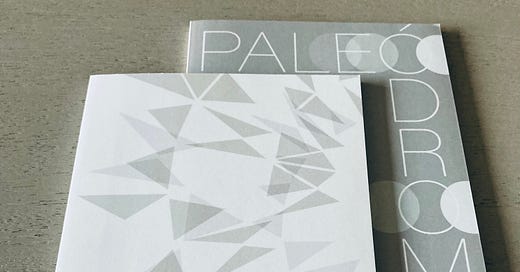a sacrile[d]ge
In celebration of the first anniversary of The Wreck of the Large Glass / Paleódromo
A year ago tomorrow, on Bastille Day, in the midst of the pandemic, Sublunary Editions published The Wreck of the Large Glass / Paleódromo, a two-faced, dual + language book of poems to which the very last comma was added in 2006.
It is, in other words, a collection of my juvenilia in verse—the prose being gathered in 2019’s Díptico gnóstico (Lima, Hueso Húmero), an English edition of which may be forthcoming.
The poems in this collection encompass my life in three countries—Jamaica, ~94-98; Peru, ~98-02; Uruguay, ~02-05, and then, briefly, Peru again—from “Poda a Gorgias”, published when I was still an adolescent, to my immediate post-college/pre-marriage year.
Most of my poetry and fiction written since has been kept in reserve, though some of it should pop up intermittently here on The Bride.
Though not broadly circulated for coronal reasons, Sublunary did a commendable job of promoting TWOTLG/P; so much so, that the first edition sold out on a year in which, admittedly, all one could do was read.
TWOTLG/P was scantily but well reviewed, with this take by Mirko Lauer (La República, February 29, 2021) being especially generous.
[“Mónica Belevan es probablemente la poeta peruana más radical hoy. Bien lo demuestra su libro bifronte, con poemas en inglés y en castellano: The Wreck of the Large Glass / Paleódromo (Seattle, Sublunary Editions, 2020). El director de la editorial interviene para declararla una escritora joyceana, y en cierto modo lo es.
Pero no solo hay Joyce. Casi toda la gama del moderno experimentalismo poético contribuye a una escritura aventurera y a una lectura llena de sorpresas vanguardistas, tipográficas. A pesar de todo eso, es un poemario profundamente romántico. El libro merece una edición peruana apenas se faciliten las cosas”.]
In other words, the work in TWOTLG/P is fundamentally High Modern or, by our current standards, antiquarian. (Some disappointment was incurred by readers who mistook Mirko’s “romantic” for sentimental, or his “radical” for something other than based.)
The poems in TWOTLG/P are narrative and exhibitionistically compositional; erudite, peckish and cruel and aggressively rhythmic. They’re also consistent as interpellations of the canon and as explorations concerning the matter of language and style. For all their intellectual license, they predate the most important events in my life—love and marriage, loss and friendship; certain drugs. I wrote of what I knew at the time or, What I Read; though, to my credit, I read well. As a group, the poems in this collection already contend with what are still some of my main motifs, essential readings / loci / world events and images that I keep coming back to, and with my interest and affection for the other arts (not just the seven).
They are also possessed of an unusual sense of humour I can only liken to perversely versified Menippean satire. My general taste may be Greek; my bad taste is decidedly more aquiline.
The coverart of TWOTLG/P is by the inimitable Yanina Spizzirri who also, brilliantly, illustrated Díptico gnóstico the year before. The decision to publish TWOTLG/P after almost fifteen years of having it sit in a drawer is, completely and entirely, on Joshua Rothes.





